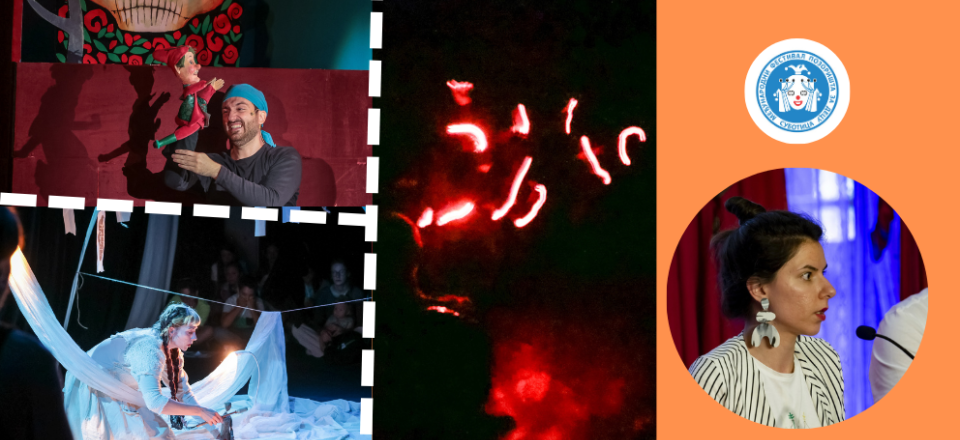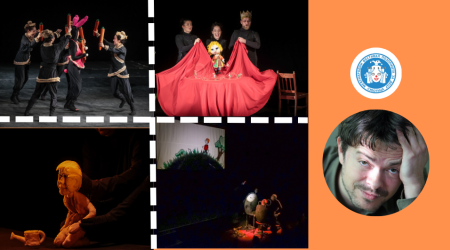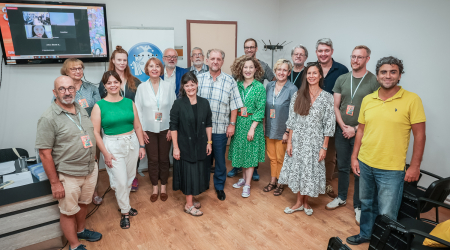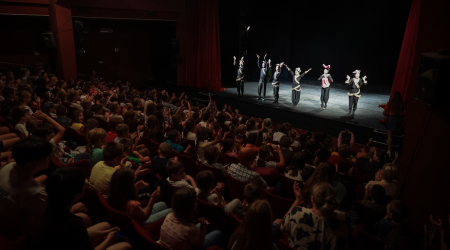News
From a Puppet to the Shadow
Back to...
From a Puppet to the Shadow
Divna Stojanov
Paprika Jansci and the Devil's Tongue is a traditional puppet play in every sense. Staged by the Harlequin Theatre from Hungary, it boasts a tall stage screen, utilizes hand puppets and songs expressing hero’s emotional state with a script based in traditional folklore... Since the story is focused on folklore hero Jansci – a character donning a cap in the shape of a chili pepper - and since we are introduced to the story by a witch brewing a pepper potion, director Olivér Szilner ingeniously brings together two nations known for their hot pepper. In terms of stage design and overall aesthetics, the entire story is given a Mexican undertone with visual tribute to Frida Kahlo’s opus. The faces of the witch and her bird-assistants are reminiscent of Frida's paintings in terms of color and technique. Pepper Jansci, overcoming various obstacles, reaches the habanero pepper in midst of a typical Mexican landscape (a desert with an obligatory cactus and a Mexican playing the guitar). Although the crowd cheered for Jansci all the time, the sight of Jansci - a puppet with strong Hungarian national features - beating up an all-black puppet representing the Devil as the children cheered, was disturbing. Apart from the fact that the play largely promoted violence as a solution to conflict, the scene with the Devil has possible racist connotations - although I believe this wasn’t the director's intention but rather a clumsy set of circumstances. This does not necessarily mean traditional stories children were told for centuries should be changed entirely - they still convey certain values - but perhaps we should consider some more subtle solutions directing-wise. Also, the puppets were often drowned out by the amount of speech and the play was generally dialogue-heavy. Writing this review after having watched every play on this year’s festival’s repertoire, I must note that Paprika Jansci and the Devil's Tongue engaged the attending children the most in terms of cheering, suggesting solutions to character’s dilemmas out-loud, dancing to the music and rejoicing in character’s triumphs.
Next on festival's program was the play Seal-Woman written, directed and performed by Lucia Svobodova of Anima-Act theatre from Slovakia. Thanks to the printed synopsis of the play being handed out before the beginning of the performance, it was somewhat possible to follow the plot. The story is based on an Inuit myth about the close bond between humans and seals. A sailor falls in love with a seal-woman who then has to give up a part of her identity to be with a man. Later, she realizes that her sacrifice was too great a price to pay and returns to her roots. Basically, the plot of The Little Mermaid - only backwards. The viewer could probably lose the sense of boredom only if he stopped trying to comprehend what he was watching and focused on interpreting the fictional language in which the actress spoke. If the viewer watches the play without looking for any logic, he or she will, at least in this case, find some enjoyment in its music and sound effects performed on the stage (by Denis Uherov and Lucia Svobodova).
The last performance on the fourth day of the festival was Nocturno by The Flying Cow theatre from Estonia, directed by Jevgeniy Ibragimov. This is an immersive performance in which the audience walks across the stage in total darkness all the while the actors illuminate the figurines. The shadow-play they managed to produce is simply magical. However, the show’s main premise that "the world should not be changed, because it is already beautiful, but instead we as individuals should change" is problematic. This may be true for certain aspects of life, but on the macro-level it is an utter pacification of both the individual and the society.
A great value of this festival is its ability to showcase completely different approaches to theatre - questioning what a theatrical act is and which elements are needed to define it, an opportunity to watch performances from different parts of the world. Only on the fourth day of the festival, the youngest audience had the opportunity to witness that the play can be non-verbal, to learn what shadow-theater is, that you don't even have to sit in the theatre, that the play is created from old legends and from a modern text, that different people have different traditions, how can music and sound be utilized in theatre... That sort of hands-on education is possibly the greatest value of the Festival.
Back to...












